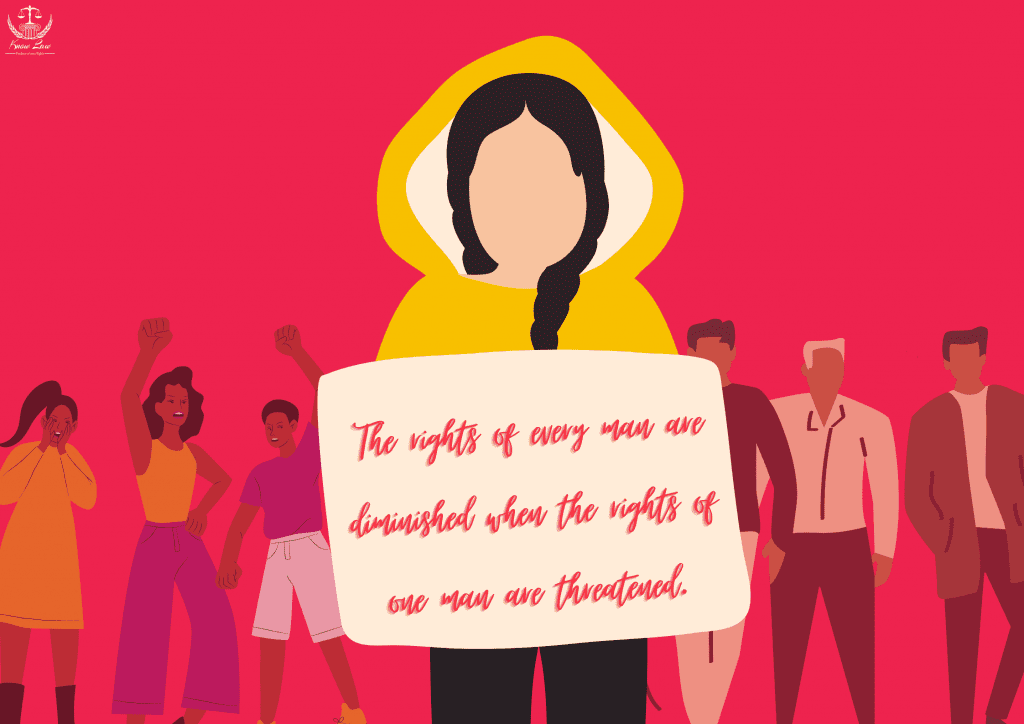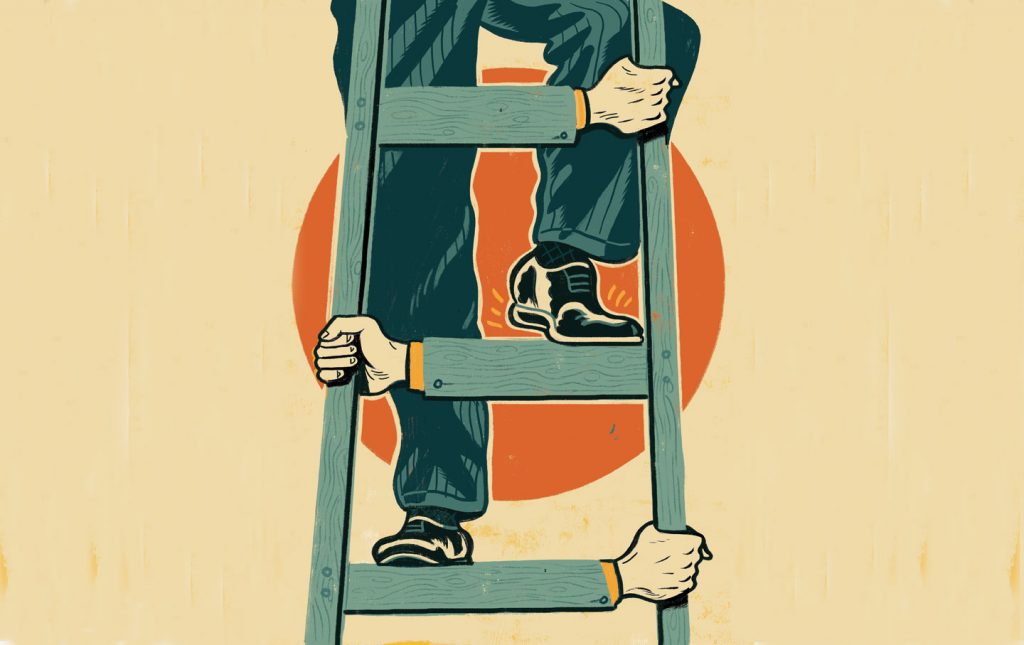
Man is a social animal, from birth to one’s death, every human being has the right to live with dignity and is as well entitled to certain rights necessary to live such life with due respect, utmost dignity, equality, and brotherhood. There should be mutual respect for the life of another among every individual and thus, this could be achieved by the rights prescribed by law under the title of Human Rights.
The United Nations postulates that Human Rights are the rights inherent to all human beings regardless of their race, sex, nationality, ethnicity, language, religion, or any other such statutes and are available without discrimination. Human Rights include the right to life and liberty as well as freedom from slavery and torture, freedom of opinion and expression, the right to work and education, and many more. Thus, it can be rightly said that each and every one of the global population is entitled to these rights by virtue of being born a human and cannot be taken away from him or her as they are indispensable in nature.
To define the term Human Rights as per the letters of the law in accordance to the Protection of Human Rights Act, 1993, it means the rights relating to life, dignity, and equality of the individual guaranteed by the Constitution of India or embodied in the International covenants and enforceable by the Courts of Law in India.
To develop any nation or state as a wholesome society, the upliftment and protection of human rights are thus absolutely imperative. The Constitution of India protects, uplifts, and guarantees the basic human rights to every citizen by virtue of the Fundamental Rights and the Directive Principles of State Policy (DPSP) enshrined in the Constitution of India which are at par with the International Covenant on Civil and Political Rights (ICCPR) and Universal Declaration of Human Rights ( UDHR).
The fact that India is a signatory to the Universal Declaration of Human Rights (UDHR), its principles and norms as well as being members and party to various other International Covenants there is a distinct pressure and obligation to uphold the human rights law to its true efficacy by implementing the principles in actual practice.
All humanity is one undivided and indivisible family and each one of us is responsible for the misdeeds of all others. I cannot detach myself from the wickedest soul.
Mohandas Karamchand Gandhi
The Genesis of Human Rights Law in India

Human Rights in the history of India dates back to the Vedic Ages. The principles of Buddhism & Jainism, the religious texts of the Gita, the Vedas all contain provisions of human rights and their protection in their core value.
In the medieval periods, with the advent of the Mughal empire or Mughal rule, the concept of human rights lost its true meaning. Modern India which signifies the beginning of the British rule in India, saw total deprivation of human rights, the core of it being felt by the citizens of India under British dominance. Thus, this deprivation at the hands of the British over two centuries was also kept in mind while framing the Constitution of India and it was ensured that utmost importance is to be given towards the progression and protection of human rights and through its continuous amendments as the nature of any society is dynamic in nature.
Since the Independence of India, the development of human rights gained huge momentum in the nation as various legislations were also enacted in the country which includes Protection of Human Rights Act, 1993; The National Commission for Minorities Act, 1992; National Commission for Women Act, 1990; Protection of Civil Rights Act, 1995 along with Child Labor (Prohibition and Regulation) Act, 1986; Juvenile Justice (Care and Protection of Children) Act, 1986; Bonded Labour System (Abolition) Act, 1976; Right to Information Act, 2005 along with many such other enactments in the Constitution of India.
Contra-Indications of Human Rights Law
The nature of these rights is the same all across the globe with the only difference being in the actual implementation or enforcement of the existing human rights laws. It should also be kept in mind that these rights exist in an ever-changing society, so the laws need to be amended and improved upon from time to time whenever there is any conflict between the rights and their adverse implication on the citizens of the State.
Freedom of Speech and Expression is one such fundamental as well as a basic human right which although, enshrined in Article 19 (1) (a) of the Constitution of India is violated excessively by the State officials and authorities. Laws, such as Sedition, Defamation, and Counterterrorism are regularly invoked to silence the citizens of a nation from holding or expressing opinions that are at variance with those commonly or officially held. Procedures such as total blanket internet shutdown are also being resorted to prevent violence and to respond and tackle the ongoing law and order problem which is also a violation as providing and having access to a basic source of information and the world news falls under the category of Right to Information (RTI) as well as a basic human right.
Journalists and activists who voice their opinion against this manipulation for the general public are too threatened with legal action or arrested arbitrarily to keep them in checks. Draconian Sedition Laws are used across the country to crack down on peaceful protests against discriminators and prohibitory orders issued.
Women’s rights in India have been continuously violated in the forms of rape, sexual harassment, and domestic violence not only by some unknown perpetrators but by spouses and relatives as well and society has not been able to prevent it. Certain significant steps have been taken in the right direction to preserve the rights of women through enactments such as the Muslim Women (Protection of Rights on Marriage) Act or the Equal Remuneration Act, 1976, but there is still a long way to go in addressing the deeply ingrained gender inequalities in our society which prevent women from fighting against the discrimination.

The National Commission for Women set up in 1990 is a step in the right direction which has taken up the cudgels of women’s rights in providing for a common forum to fight against the injustices faced by the women of our country and help remove the bias as well as discrimination face by them. But the path ahead is strewn with obstacles and to overcome these obstacles there is a long battle ahead.
The right to privacy and the protection of sexual orientation are fundamental rights guaranteed by Articles 14, 15, 19, and 21 of the Constitution of India. The LGBT community possesses the same rights as any other citizen of India. Section 377 of the Indian Penal Code, 1860, criminalized same-sex relationships and was thus in conflict with the fundamental rights guaranteed by the Constitution of India. In the year 2009, the Hon’ble High Court of Delhi decriminalized consensual same-sex relationships but this verdict was overturned by the Hon’ble Supreme Court in 2013. But after decades of struggle by activists and lawyers and the LGBT community finally, a constitutional bench of the Supreme Court of India struck down section 377 of the Indian Penal Code, 1860, and decriminalized homosexuality.
The Transgender Persons (Protection of Rights) Bill, 2008 was passed in 2018 but instead of protecting them, the Act undermines their rights and violates India’s international human rights obligations. The Act lays vague procedures to be followed for legal gender recognition of transgender persons. Amendments to various acts such as the Citizenship Act, 1955, Unlawful Activities (Prevention )Act, 1967, and the Right to Information Act, 2005 were introduced and are regressive in nature like the amendment to UAPA,1967 broadening the definition of ‘terrorist’ that gave the government unchecked powers to implicate individuals for their disagreement, dissent, and criticism.
The Right to Information Act was enacted in 2005 after decades of struggle by activists. Right to Information as a fundamental right is not expressly stated in the Constitution but can be interpreted from Article 19(1)(a) and Article 21. But the years of struggle to make the Right to Information a fundamental right were diluted when the unbiased and independent nature of the Information Commission was compromised by the recent amendments which brought the conditions of service of its members under the jurisdiction of the Central Government.
The Citizenship (Amendment) Act, 2019 adversely affected the Muslim refugees and violated their human rights. The amendments allowed the Hindus, Sikhs, Jains, Buddhists, Parsis, and Christian from neighboring countries to seek asylum in India but similar facilities were not granted to the Muslims. A National Register for Citizens (NRC) which documents the legality of citizenship of more than 1.3 billion Indian population was also mandated in December 2019. But due to nationwide protests against this mandate, the government has held it in abeyance until further notice.
The Rights of the indigenous people were also violated when the Hon’ble Supreme Court of India ordered the eviction of the forest dwellers under the Scheduled Tribes and Other Traditional Forest Dwellers (Recognition of Forest Rights) Act, 2006 also known as the Forests Act on the basis of a petition filed by wildlife protection groups. This resulted in affecting more than 2 million families. The order has been put on hold but their predicament needs to be addressed so that the tribal people are not uprooted from their roots and indigenous habitats and can continue their way of life.
Communal conflicts have been prevalent in India since before Independence. Hate crimes against various ethnic groups specifically the Muslim community as well as caste-based riots and violence are rampant across the country carried out by vigilante groups. Legislations against these violations are not enough although some states have enacted laws to criminalize mob lynching as a separate offense.
The abrogation of Article 370 of the Constitution of India in August 2019 and the subsequent introduction of the Jammu & Kashmir Reorganisation Bill removed the special status enjoyed by the State since 1954. Clampdown on civil liberties, communication blackouts, and detention of political leaders and activists preceded the abrogation. Various detention laws were used as well as freedom of the press was censored to curb the protests and dissemination of information.
Ineffectiveness of the Human Rights Commission
The Human Rights Commission was established in India in the year 1993 to inquire into, govern and provide relief to instances of human rights violations but faces many structural, administrative, and practical limitations. The Commission is a statutory body under the Protection of Human Rights Act, 1993 which is empowered to inquire into violations of human rights by the Government of India or any Public servant and recommend measures for their removal. But the Commission can only recommend and cannot force compliance to their recommendations. The Government often rejects the recommendations outright or comply partially, or the compliance is so delayed that it loses its effectiveness. The Commission is basically a toothless tiger as they do not have jurisdiction to investigate the armed forces which often violates human rights.
India is a vast multi-cultural country with diverse ethnicities. Literally, thousands of complaints are lodged with the Commission which is impossible to address due to capacity and commitment gaps. Lack of knowledge or human rights literacy among the society, bureaucratic system of working of the Commission, interminable delays in court cases lack commitment or the part of the government contribute to the ineffectiveness of the human rights laws
Conclusion
For human rights to be successful as a concept and law and for assured implementation of the enacted provisions of various legislations, the basic pillar should be Dignity. Although these rights are the right of an individual by virtue of birth, the Constitution of India protects these rights in writing by way of Fundamental Rights and Directive Principles of State Policy enshrined in the Constitution.
Almost all the rights provided in the Universal Declaration of Human Rights (UDHR) are covered in the Constitution of India but there remain gaps in the actual implementation of the right. The citizens need to fight tooth and nail to enjoy the rights available to them. Many legislations have been enacted to protect human rights but their implementation and effectiveness leave more to be desired.
The Judiciary has also taken great steps to relax the rule of locus standi to allow persons’ other than affected ones’ to approach the Court to seek remedy but it is upon the Government to make the laws effective. There is also a dire need to amend or scrap the repressive laws that create obstacles in the path of effective human rights for Indian citizens and keep up the spirit of human rights in modern society.
Editor’s Note
The author of this article discusses the gaps in human rights law. The author begins with the genesis of human rights law in India and further its contra-indications. The author also points out the ineffective nature of the Human Rights Commission and finally concludes with the need for effective implementation of such laws.